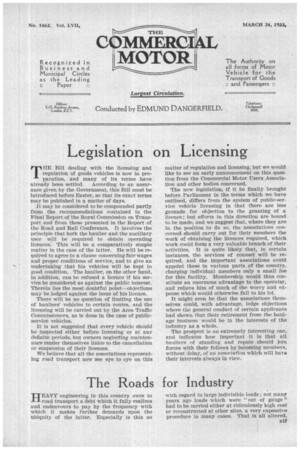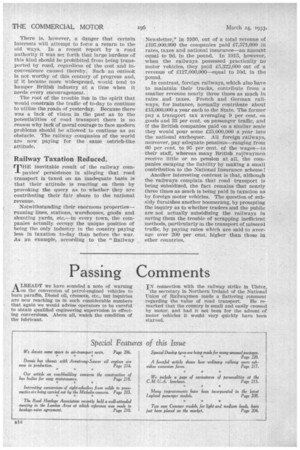The Roads for Industry
Page 27

Page 28

If you've noticed an error in this article please click here to report it so we can fix it.
F'EAVY engineering in this country owes to road transport a debt which it fully realizes and endeavours to pay by the frequency with which it makes further demands upon the ubiquity of the latter. Especially is this so with regard to large indivisible loads ; not many years ago loads which were "out of gauge" had to be carried either at ridiculously high cost or reconstructed at other sites, a very expensive procedure in many cases. That is all altered. There is, however, a danger that certain interests will attempt to force a return to the old ways. In a recent report by a road authority it was set forth that large burdens of this kind should be prohibited from being transported by road, regardless of the cost and inconvenience caused thereby. Such an outlook Is not worthy of this century of progress and, if it became more widespread, would tend to hamper British industry at a time when it needs every encouragement.
The root of the trouble lies in the spirit that would constrain the traffic of to-day to continue to utilize the roads of yesterday. Because there was a lack of vision in the past as to the potentialities of road transport there is no reason why lack of moral courage to face modern problems should be allowed to continue as an obstacle. The railway companies of the world are now paying for the same ostrich-like attitude.
Railway Taxation Reduced.
THE inevitable result of the railway companies' persistence in alleging that road transport is taxed on an inadequate basis is that their attitude is reacting on them by provoking the query as to whether they are contributing their fair share to the national revenue.
Notwithstanding their enormous properties— running lines, stations, warehouses, goods and shunting yards, etc.—in every town, the companies actually occupy the unique position of being the only industry in the country paying less in taxation to-day than before the war. As an example, according to the "Railway Newsletter," in 1930, out of a total revenue of £197,000,000 the companies paid £7,571,000 in rates, taxes and national insurance—an amount equal to 9d. in the pound. In1913, however, when the railways possessed practically no motor vehicles, they paid £5,322,000 out of a revenue of £127,000,000—equal to 10d. in the pound.
In contrast, foreign railways, which also have to maintain their tracks, contribute from a smaller revenue nearly three times as much in rates and taxes. French and German railways, for instance, normally contribute about £15,000,000 a year each to the State. The former pay a transport tax averaging 9 per cent, on goods and 33 per cent, on passenger traffic, and if the British companies paid on a similar scale they would pour some £25,000,000 a year into the national exchequer. All foreign railways, moreover, pay adequate pensions—ranging from 60 per cent. to 95 per cent. of the wages—to their staff, whereas many British railwaymen receive little or no pension at all, the companies escaping the liability by making a small contribution to the National Insurance scheme !
Another interesting contrast is that, although the railways complain that road transport is being subsidized, the fact remains that nearly three times as much is being paid in taxation as by foreign motor vehicles. The question of subsidy furnishes another boomerang, by prompting the inquiry as to whether traders and the public are not actually subsidizing the railways in saving them the trouble of scrapping inefficient methods, particularly in the transport of mineral traffic, by paying rates which are said to average over 200 per cent, higher than those in other countries.




























































































